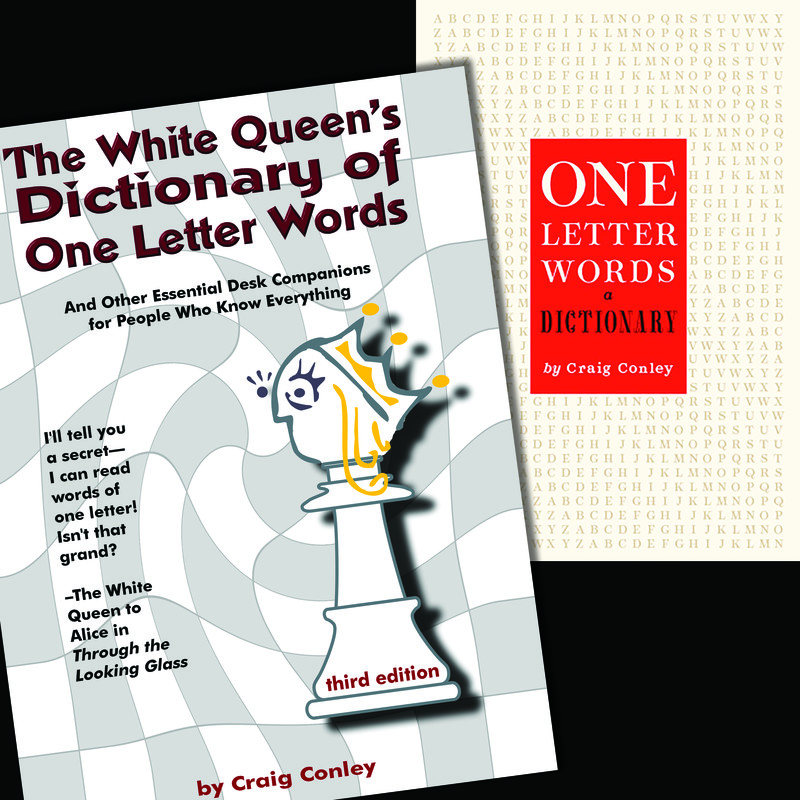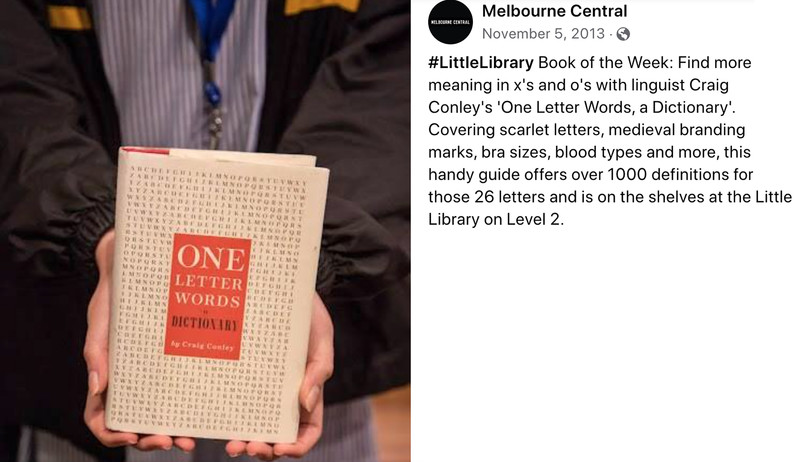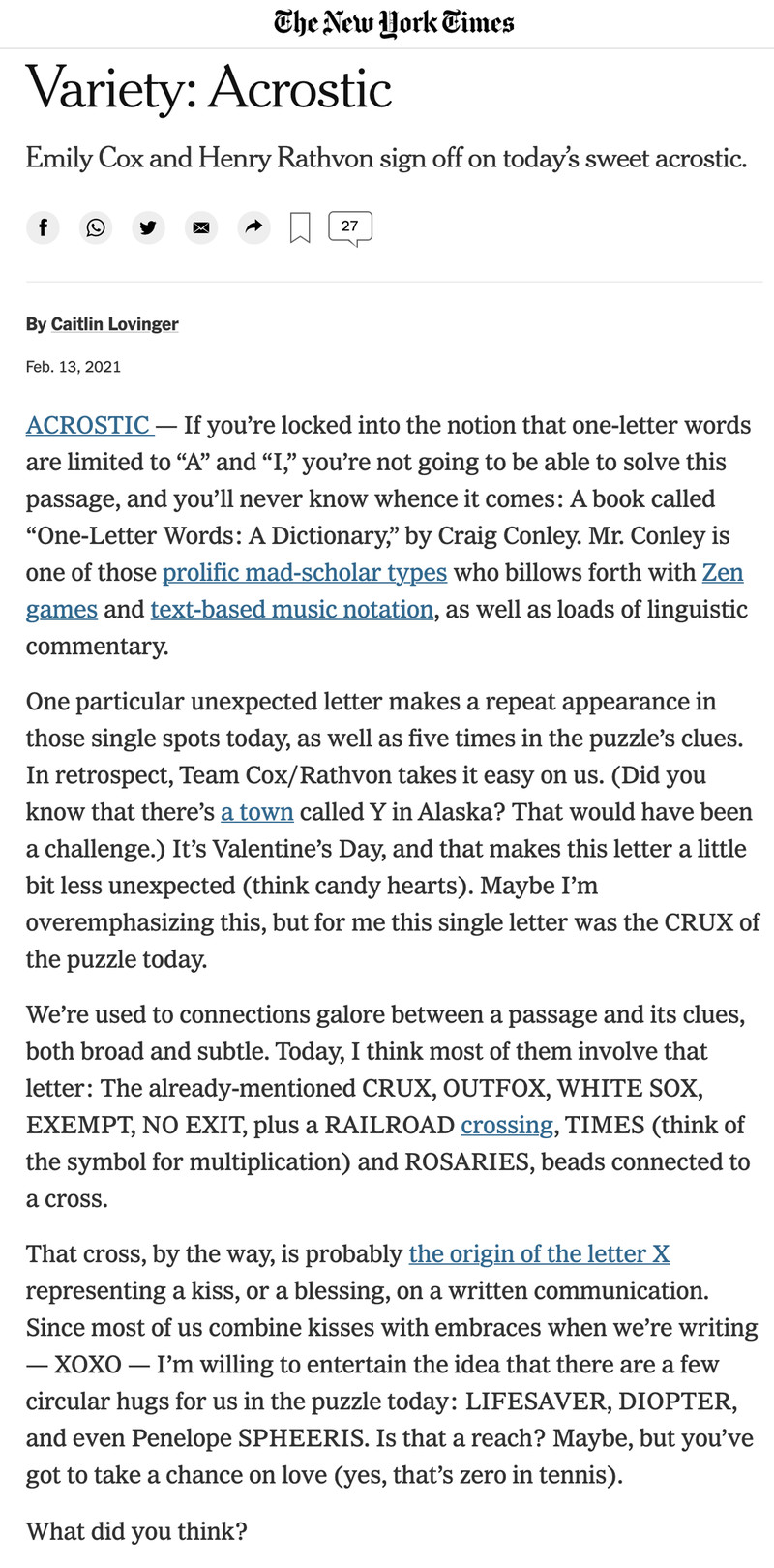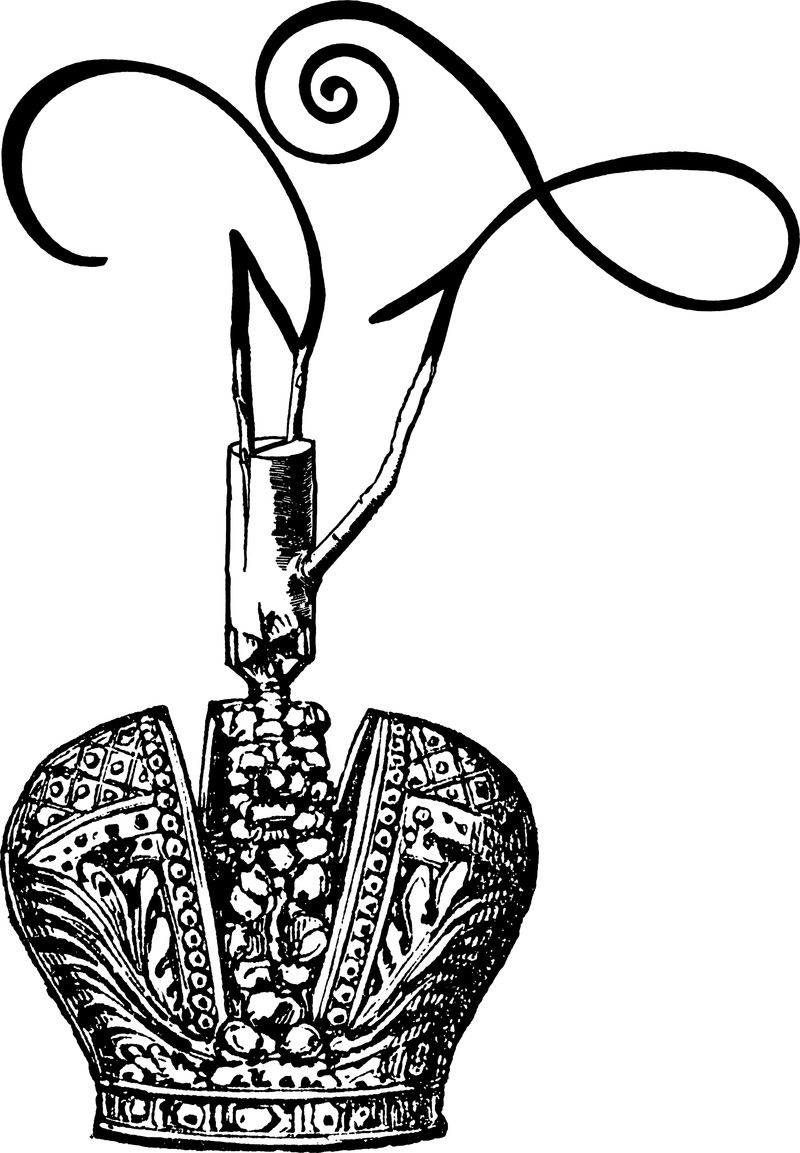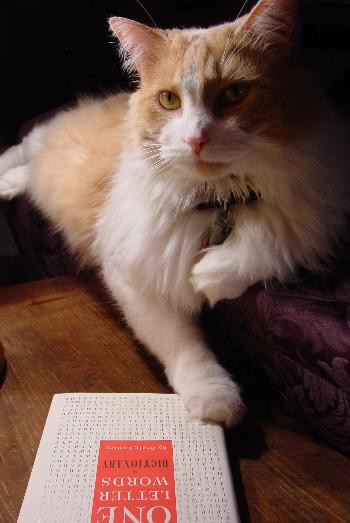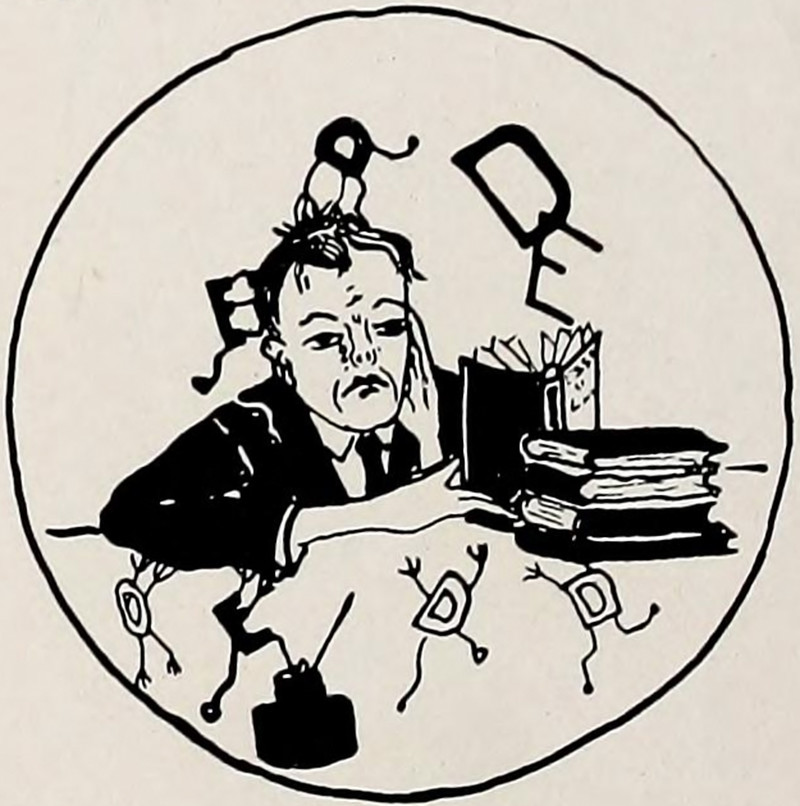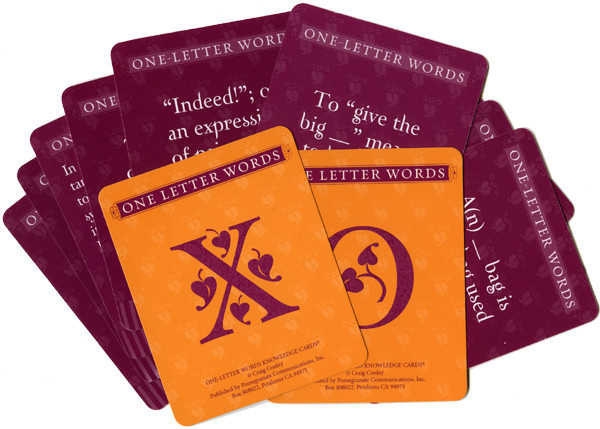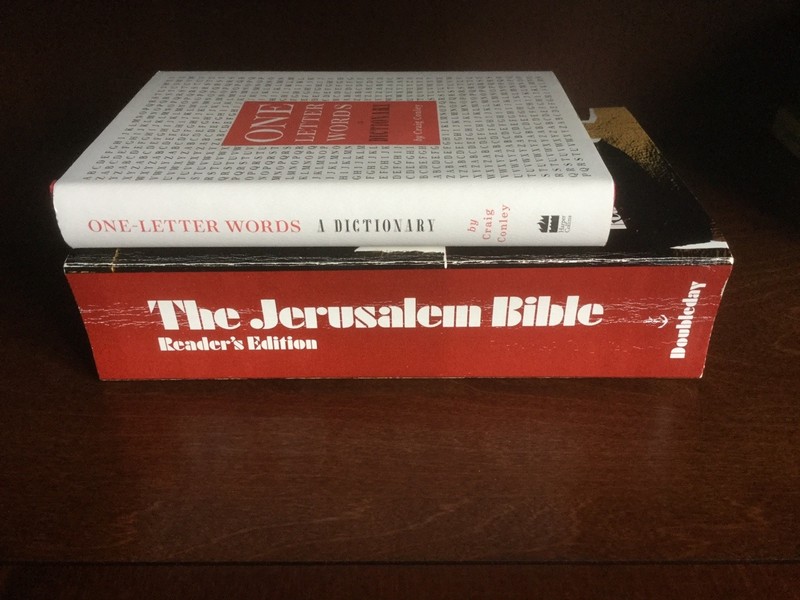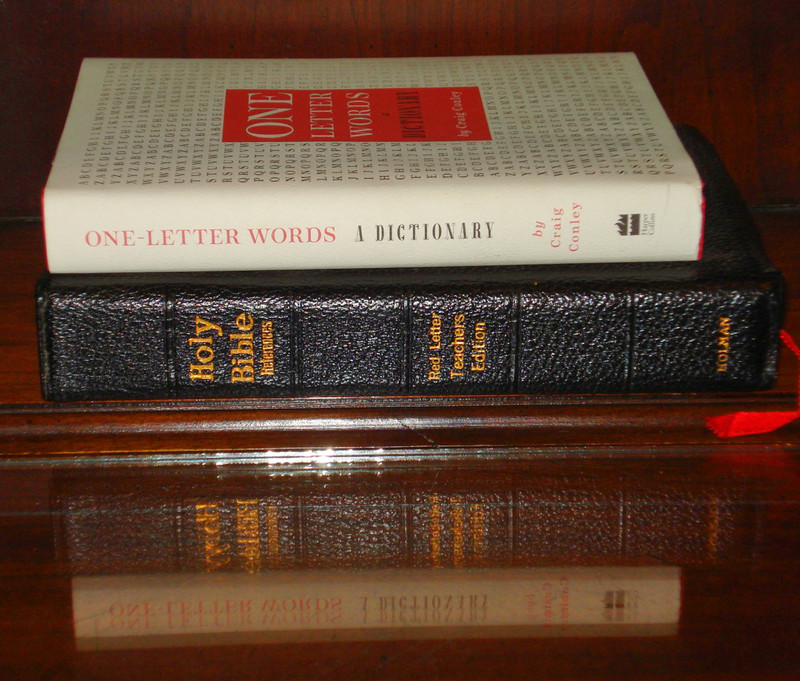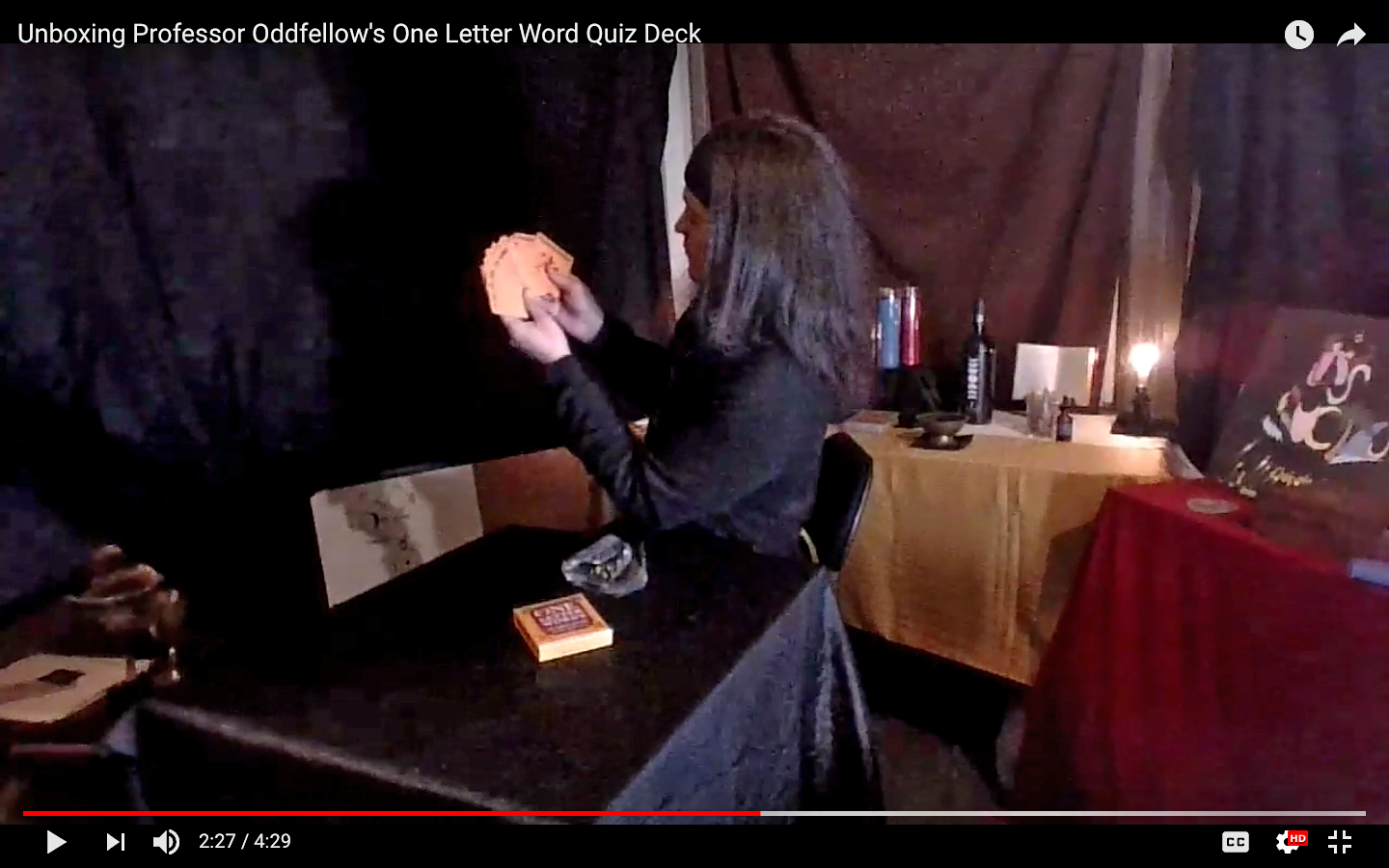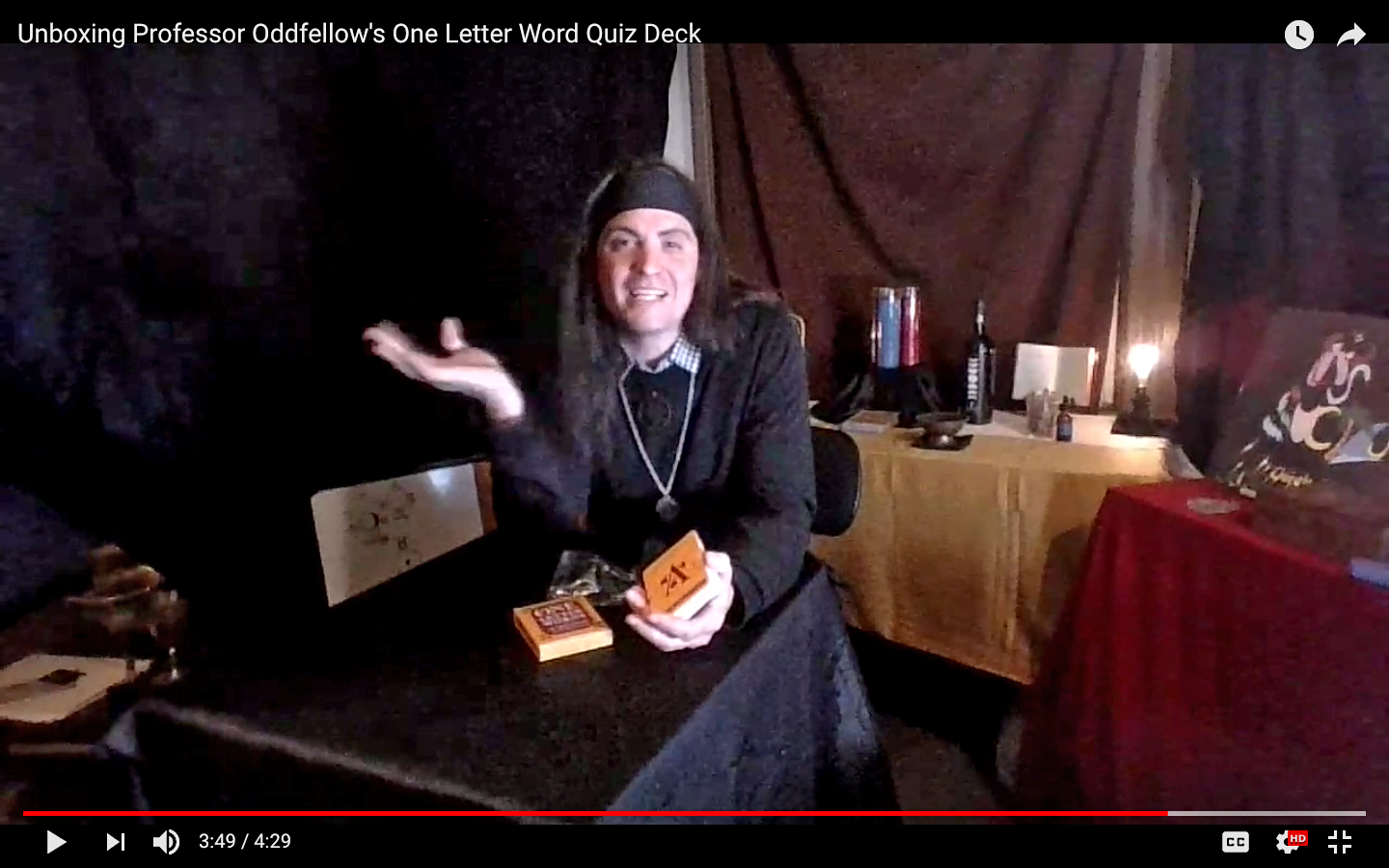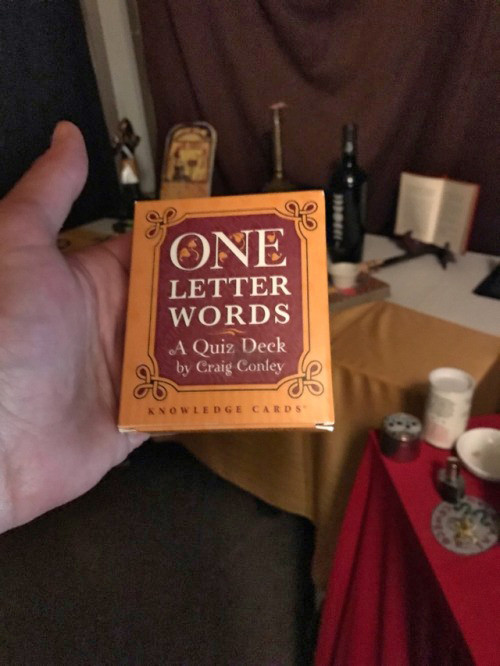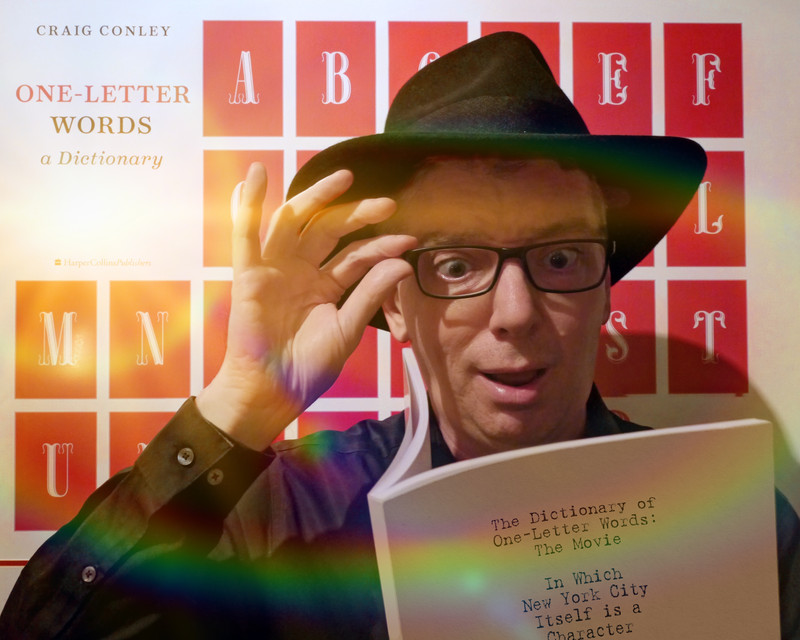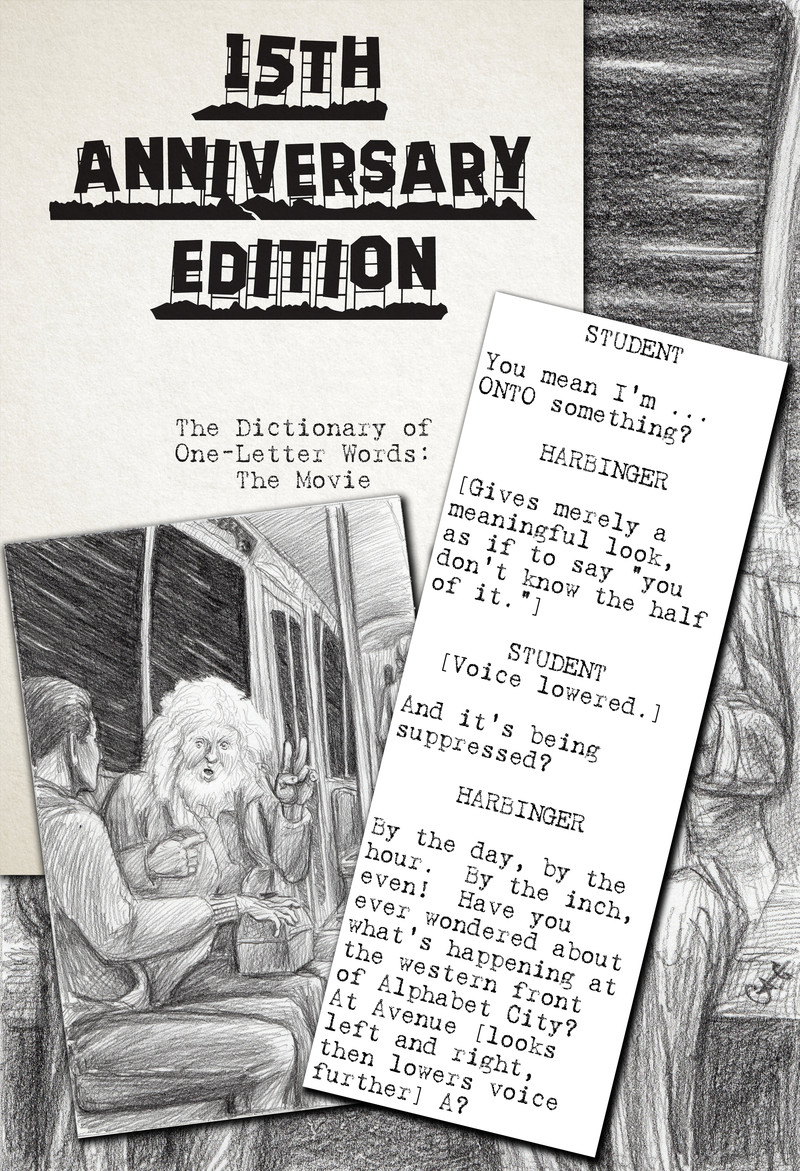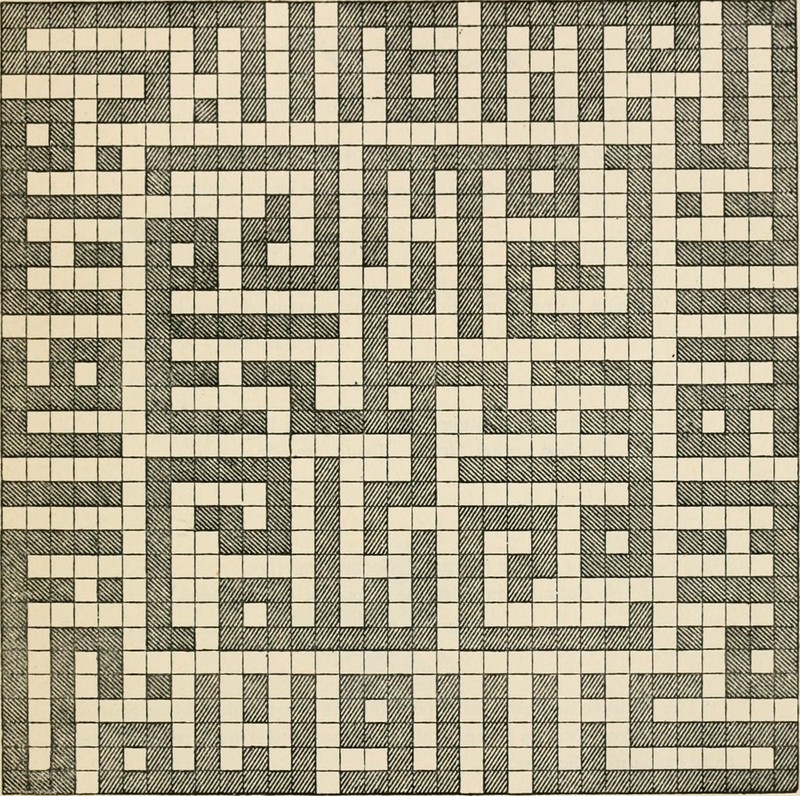Found 31 posts tagged ‘one-letter words’ |


 |
|
Go Out in a Blaze of Glory –
March 13, 2021 |
(permalink) |
|
 |
 |
 |
|

 |
|
|
 |
 |
 |
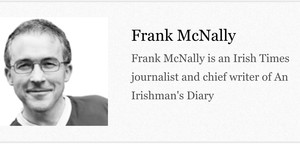
We're delighted that our One-Letter Words: A Dictionary features prominently in The Irish Times. Columnist Frank McNally wondered whether our chapter on the letter R included the "great R of our times, the coronavirus reproduction rate":
The viral R is conspicuously absent from one of the more eccentric lexicons on my bookshelf, A Dictionary of One-Letter Words by Craig Conley, published back in 2005, when Sars was the worst health crisis facing the world.
Conley’s entries for the letter instead include the fact that it is a movie rating guide, that it was the old Roman numeral for 80, and that in algebra, it represents “a square upper triangular invertible matrix with positive entries on its diagonal”. Phew. It was also one of several letters with which, in the past, criminals were branded. To be R-rated in that context meant you were a “rogue”.
Under the subheading of “literature”, meanwhile, the dictionary includes a quotation from Daphne du Maurier’s Rebecca, wherein the unnamed narrator finds a book dedicated by her husband to his previous love, the Rebecca of the title and, tearing the page out, throws it into the fire, watching it disappear: “The letter R was the last to go, it twisted in the flame, it curled outwards for a moment, becoming larger than ever. Then it crumpled too; the flame destroyed it. It was not ashes even, it was feathery dust.”
Read in the context of the pandemic, that passage carries an optimistic message. As we look forward to a curve-flattening summer and autumn, we all hope to see the R crumple and disappear.
Less happily, in the book, the memory of Rebecca haunts the narrator throughout. But on the plus side, I find on looking up the rest of that passage in the original text, that it continues, aptly: “I went and washed my hands in the basin. I felt better, much better.”
|


 |
|
Go Out in a Blaze of Glory –
January 31, 2020 |
(permalink) |
|
 |
 |
 |
I'm sorry, but you have to laugh: an Amazon reviewer named Marilyn W. Barclay rated our One-Letter Words: A Dictionary with 3 stars because it was "interesting but not what I expected." It's a dictionary of one-letter words. That's what it's called, and that's what's in it: definitions of one-letter words. But somehow it's the book's fault that it's not what she expected? She ends her review, " interesting just not useful for Scrabble." Hey, tell it to Scrabble, not us. We didn't write the rules. Meanwhile, we rate Marilyn W. Barclay's review zero stars. Oh, maybe she was in fact looking for our dictionary that is, indeed, great for winning at Scrabble: Webster's Dictionary of Improbable Words: All-Consonant and All-Vowel Words.
|



 |
|
Go Out in a Blaze of Glory –
January 13, 2020 |
(permalink) |
|
 |
 |
 |
I never gave much thought to one-letter words until I discovered they have their own dictionary. I bought a copy of the dictionary and read in its preface the claim that despite there being only 26 letters in the English alphabet, they represent more than 1,000 units of meaning.
One-letter words are important building blocks of communication. Learning them is easy and so is spelling them, but you shouldn’t underestimate their value. Many of the most important English words are small, and these little words are relatively few in number. But they occur very often in our speech, writing, and reading. A mere ten words account for 25 percent of all the words we use, and all of them have only one syllable. Fifty words account for 50 percent of all the words in our speech, and they also have only one syllable.
Furthermore, two of the top six words we use in speech and writing have only a single letter: a and I. A is the third most frequently occurring word in the English language. I is the sixth most common.
One of our favorites is X, which claims more than seventy definitions on its own. X marks the spot where treasure is buried on a pirate’s map. It’s a hobo symbol meaning handouts are available. X tells you where to sign your name on a contract or will, and it’s also an illiterate person’s signature. X indicates a choice on a ballot, and a mysterious person may be named Madame X. It also marks an incorrect answer on a test, and is the rating for an adult movie. This list could go on for quite a while, but I’ll stop with the designation of a kiss at the end of a love letter.
Craig Conley, the author of the dictionary of one-letter words, confesses that he wrote the first entry in his dictionary in a fit of procrastination while a graduate student spending many hours a day in the library working on his thesis. He was intrigued by all the enormous dictionaries on the shelves, and on a whim he started looking up entries for the 26 letters of the alphabet. He jotted down a variety of tidbits, and those notes became the basis for his dictionary.
For example, remember the expression, “Mind your p’s and q’s” as a comment on behavior. As a English teacher I am familiar with Hawthorne’s story entitled “The Scarlet Letter,” about a woman condemned to wear an A (for the crime of adultery) embroidered on her breast. Here’s his description in the first chapter: “On the breast of her gown, in red cloth, surrounded with elaborate embroidery and flourishes of gold thread, appeared the letter A.”
The letter Q has a special meaning in the field of Biblical criticism, when it refers to material common to the Gospels of Matthew and Luke that is not derived from the Gospel of Mark. R is used in the expression “the three R’s (reading, writing, and arithmetic).” It also designates a movie rating prohibiting attendance by anyone under seventeen not accompanied by a parent or guardian.
In school the letter S is used as a grade rating a student’s performance as satisfactory. T can be used to describe a way of doing something perfectly: “We could manage this matter to a T.” T-bone refers to a thick loin steak containing a T-shaped bone. Until 1827, convicted thieves in England were often branded on the thumb with a T.
The term U-boat referred to a military submarine. V stands for the Roman numeral for five; with a line over it, it signifies five thousand. Z is almost universally recognized as a symbol for sleep, as in “It’s going to be a long night’s vigil, so if you want to catch some z’s work it out with your buddies.”
Clearly, one-letter words are numerous and important enough to deserve their own dictionary. You’ll find Craig Conley’s One-Letter Words: A Dictionary on sale at Amazon.
 |
|
|

 |
|
The Right Word –
September 19, 2019 |
(permalink) |
|
 |
 |
 |
It is an outright lie that there are very few one-letter words and that they're rarely misspelled. For proof, see One-Letter Words: A Dictionary. This false quotation is from Word Juggler User's Manual, 1984.
|


 |
|
Go Out in a Blaze of Glory –
July 18, 2019 |
(permalink) |
|
 |
 |
 |
We're delighted that J. Keith Vincent called our One-Letter Words: A Dictionary a "chrestomathy" at a symposium about the Japanese author Edogawa Ranpo and whether or not a person could craft an entire narrative out of a single letter of the alphabet. " If Craig Conley could come up with thousands of meanings for the 26 letters of the alphabet, who’s to say how many stories might not be condensed into any one of those letters?" Here's how Vincent's paper begins:
I recently ran across a curious dictionary of nothing but one-letter words. The author of One-Letter Words: A Dictionary spent fifteen years compiling 275 pages of definitions of words consisting of only one letter. This is the dictionary, as one reviewer put it, for “anyone who has forgotten that Z was the Roman letter for 2000.” It also reminds us that “X” has no fewer than seventy meanings in addition to “10,” including everything from “wrong” (“batsu” in Japanese as well) to the place where one’s signature on a ballot should go, to a rating for an adult movie, a power of magnification and, of course, the symbol for a kiss.
I discovered this little alphabetical chrestomathy because its author, Craig Conley, cites as his inspiration a story by a detective novelist that I have written about and translated. “It’s hard to pinpoint exactly when I first got the idea to write a dictionary of one-letter words,” Conley writes. But “I remember once hearing about a bizarre Japanese crime novel from 1929, The Devil’s Apprentice by Shiro Hamao, and how the entire work consisted of a single letter. The single letter was obviously a written correspondence, but I initially envisioned a single letter of the alphabet. And I marveled at how bizarre indeed it would be to write a detective story that all boiled down to a solitary letter of the alphabet!”
Hamao’s story is indeed taken up by a single letter. It is written by a man in jail for murder, and addressed to his former lover, who is also the prosecutor trying his case, and whom the alleged murderer blames for leading him astray into homosexuality and other crimes. Conley’s productive misinterpretation of the story as a novel consisting of a “single letter” (一つとの文字) rather than “a single letter” (一通の手紙) is a great example of what can be gained, rather than lost, in translation. The misunderstanding, based on single scrap of text without context, opens his mind to the signifying capacity of single letters and leads him to produce his dictionary of one-letter words, like some queer companion volume to George Perec’s La Disparition, a detective novel that was famously written without ever using the letter “e.”
Might it be possible to tease a narrative out of just one letter? A single “character” one would have—protagonist perhaps. If not a majuscule, a miniscule character, one who could at least play a minor supporting role in a drama to which our imagination might supply the rest. Conley continues, “I imagined some sort of gritty retelling of Nathaniel Hawthorne’s novel The Scarlet Letter, where a bloody letter A serves as the only scrap of evidence to unravel a seedy tale of adultery, heartbreak, and murder.” If Craig Conley could come up with thousands of meanings for the 26 letters of the alphabet, who’s to say how many stories might not be condensed into any one of those letters?
It was with such silly thoughts in my mind that I happened across a story by Hamao Shirō’s good friend Edogawa Ranpo. The story is titled “Monogram” (モノグラム) and Ranpo wrote it in 1926. As the title suggests, “Monogram” is a story about letters in their singularity. And although the story is written using many more than one letter, a close reading of Ranpo’s text shows that it has quite a lot to say about how one might, or might not, spin a tale out of “a single letter.” ...
[Link to pdf.]
 |
|
|

 |
|
|
 |
 |
 |
We're delighted that Lacey Echols called our One-Letter Words: A Dictionary "fool-proof," a "saving grace," "extremely educational, entertaining, and useful." Here's a snippet from the article "My Visit to Grant's Tome" ( Word Ways), in which our dictionary is put to the test: I wanted to find all one-letter, two-letter, three-letter, etc. words in any given word. There was one problem. Even though I have a fairly large vocabulary, I do not know many words which are one-letter words. Ask me to identify three- and four-letter words, and I am at ease. One letter? The only common single letter words are 'a' and 'I'! However, I was fortunate to hear about a book which could be my saving grace, One-Letter Words: A Dictionary, by Craig Conley. I felt my confidence begin to soar because with the help of this dictionary I should easily be able to count all one-letter words in any given word, or could I? Being a bit of a skeptic, I tested my skill with the word 'ait.' 'I' and 'a' are legitimate, but what about 't'? Sure enough, Mr. Conley provides 58 instances in which 't' is used as a word. As an example, 'it suits you to a T' uses 't' as a word. Hallelujah! But 'ait' is a fairly simple word. What about 'Mozambique'? I feel a time-consuming project ahead. Actually, the dictionary is fool-proof. There are thirty-five examples using the word 'z' and even twenty-seven examples of the word 'q'. ... I found [Conley's dictionary and Jeff Grant's Concise Dictionary of 2 Letter Words] to be extremely educational, entertaining, and useful for a novice word counter. Maybe if I never let anyone use these books, I will be able to win all games which include identifying actual words in any given word.
|



 |
|
Go Out in a Blaze of Glory –
April 29, 2019 |
(permalink) |
|
 |
 |
 |
|


 |
|
This May Surprise You –
March 30, 2019 |
(permalink) |
|
 |
 |
 |
|

 |
|
The Right Word –
February 27, 2016 |
(permalink) |
|
 |
 |
 |
Can it be true that there's a "curse of one-letter words," as per this commentary piece by Michael Carley? We can now affirm that there is, indeed, a curse of one-letter words. We were victimized by it when the Barnes & Noble book chain refused to stock our One-Letter Words: A Dictionary, published by HarperCollins. Our book is now out of print, except on Kindle, but if you encounter a hardcover copy somewhere in the world, we can assure you of one thing: though there is a curse of one-letter words, our dictionary does not constitute a demonic bible or otherwise forbidden reference.
|


Page 1 of 2

> Older Entries...

Original Content Copyright © 2026 by Craig Conley. All rights reserved.
|



